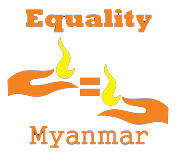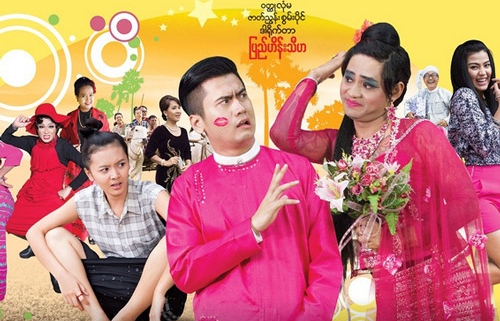Every few weeks, Thamada Cinema in Yangon displays grand new billboards to promote the latest Myanmar film on offer.
Larger-than-life characters strike larger-than-life poses. There’s the young male hero, the innocent girl, the brooding matriarch and – almost without fail – the bumbling LGBT character.
It’s usually an effeminate gay man or transgender woman, lost in silliness or a cringeworthy, semi-sexual position.
In many local films screened inside Thamada and around the country, this is the only way LGBT people are portrayed: jesters, there for a laugh.
“These characters in the movies wear funny clothes and act in exaggerated ways for comedic effect. They are often portrayed as incompetent, wacky characters,” U Aung Myo Min from LGBT rights group Equality Myanmar told Weekend.
As the country lurches forward through rapid social and economic changes, the dominant representation of the LGBT community in film remains stubbornly backward.
Co-director of &PROUD and program director for Colors Rainbow LGBT Network Ko Hla Myat Tun bluntly said that the portrayal of LGBT characters in Myanmar films was “all negative”.
“[Filmmakers] are humiliating the LGBT community,” he said, adding that these portrayals make it difficult to promote “equality and non-discrimination”.
“The censorship board of the Myanmar Motion Picture Organisation does not understand the concept of human rights for LGBT people.”
Weekend reached out to director of Myanmar Motion Picture Organisation Panchi Soe Moe who said that “due to the country’s political, economic, social and educational situations, people like to watch comedy movies which can entertain them”.
“I have to say the censorship board usually goes with what the public and producers want.”
However, U Aung Myo Min stressed that these representations have a major effect on public understanding of the LGBT community: “It encourages the public to bully and mock LGBT people”.
But perhaps the most worrying element is how LGBT characters often end up disavowing their sexuality – to the delight of audience members.
U Aung Myo Min said that LGBT men and women are “miraculously cured” and “turn straight at the end of the movies”.
He said sometimes a gay or transgender person would simply touch a woman’s body and suddenly change their mind about their sexuality.
One recent example stands out: Kyi Kyi Kyal Kyal. Here, a transgender woman moves from the country to the city – only to ‘turn back’ into a heterosexual man and live happily ever after.
“Many movies promote the misconception that homosexuality can be cured … It’s like being LGBT is a disease,” U Aung Myo Min said.
Weekend also talked to well-respected local filmmakers and film experts to get their opinion of more mainstream Myanmar offerings.
Co-founder of the Wathann Film Festival – one of the country’s more renowned film events – Thaiddhi said LGBT people are usually portrayed as either “comic characters” or “sexual predators”.
He said this was especially the case in slapstick comedy films where “you can even see Myanmar Academy Award-winning actors and other leading actors portraying these stereotyped characters”.
“And these films are usually blockbusters so they have a big impact on our society. The way we see LGBT people is distorted because of these films.”
Filmmaker Lamin Oo, who was mentioned by President Barack Obama during a 2014 speech in Yangon, said he was disappointed that LGBT content here primarily consists of “male characters dressing up as women as a trick to get cheap laughs from the audience”.
“[There’s] zero understanding of the nature of their sexuality … I believe these films help to legitimise the stereotypes about LGBT people that are already prevalent in our society.”
Lamin Oo cited progress in other national film markets around LGBT content, citing the recent “nuanced and touching” The Danish Girl and the “brilliant and funny” Filipino film Anita’s Last Cha Cha.
“I think it’s [such]a missed opportunity here because the stories of LGBT lives can become wonderful films,” he said.
“Myanmar has a long way to go”.


 Equality Myanmar (EQMM) is a leading nongovernmental organization that organises a wide range of human rights education and advocacy programs, the documentation human rights violations, and provides emergency support for activists, human rights defenders, and their families. We work with a range of local civil society organizations, educators, activists, various local actors, and our programs and activities reach all states and regions in Myanmar.
Equality Myanmar (EQMM) is a leading nongovernmental organization that organises a wide range of human rights education and advocacy programs, the documentation human rights violations, and provides emergency support for activists, human rights defenders, and their families. We work with a range of local civil society organizations, educators, activists, various local actors, and our programs and activities reach all states and regions in Myanmar.
